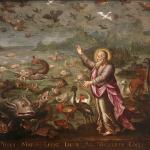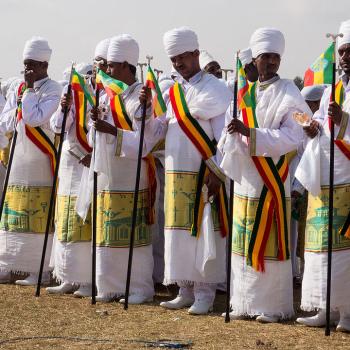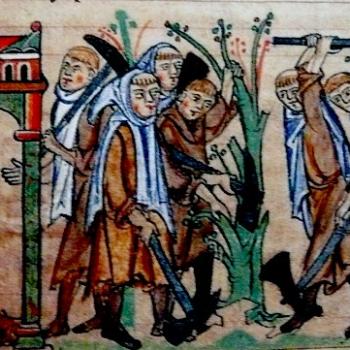
Performative piety, such as the kind done by priests during liturgies making their liturgies way too long, adding prayer after prayer, or speaking too long during their homilies, end up hurting the people they should be helping with their priestly service. They might think they are giving good examples, but they are not; all they are doing is wearing thin the patience of their community, causing many to become distracted, if not bored. When it goes on too long, even those who are spiritually inclined, even the best in the community, might find it difficult to endure all the way to the end. William of Auvergne, the bishop of Paris from 1228 – 1249, known for both his advocacy of the developing university tradition, but also for the need for theologians to preserve sound doctrine, was clearly conscious of his pastoral duty when he wrote a treatises on prayer, telling the reader (that is, clergy) to not be excessive in their public prayers, following the advice of St. Bernard:
For this reason blessed Bernard says that prayer ought to be brief and pure – not that its prolixity and length are displeasing to God, except where such prolixity also creates for others a hindrance for praying, as you know about certain priests, candle-burners, who makes Masses so long that by the boredom of their length they even dry up for the hearts of those present the grace of devotion and turn the spiritual refreshment that they are supposed to receive in Masses into the bitterness of annoyance for them. About these priests the people attending Masses can complain and say: They gave vinegar for my food [Ps 68:22]. The foolishness of such men amount to this: the take away the devotion of the whole people for the handful of devotion that is granted them in Masses, and for three or four – so to speak – tears of compunction or devotion they empty our large vessels, that is, the hearts of those praying devoutly and tearfully. [1]
Similarly, he understood the need to be pragmatic when talking about how people pray, saying that the needs of the people should always be taken into consideration when establishing the way prayers are said and done:
But as far as I can see, in one’s prayer the position of the body should be adopted and observed by which one feels that one is helped most. For I know that kneeling is an impediment to prayer for some, and similarly frequent genuflections are. For they are laborious and, therefore, they steal something for themselves from our thoughts, and for this reason they do not allow the human heart to be totally gathered to God. On this account, of all the positions of the body, a reclining one seems to me more suitable, by which one leans on some stool, especially on the left side. For such reclining gives more rest to the body and permits the heart to be freer. In fact, it seems to me to help those praying to be in prayer with the body at rest from all difficulty and with the heart free from all distraction or worry, as was written concerning Jehoshaphat, who when terrified by fear gave himself wholly to pray to the Lord.[2]
All of this, to be sure, comes from his embrace of prudence. He did not dismiss the potential value of long prayers, especially when said privately, because he knew that there could always be more to say in a given prayer:
But as Tully says that “one never says too much what is never said enough,” it seems to me that prayer is never extended or prolonged too much, because it does not seem to me that devout and rich prayer can ever be excessive, except in the previously mentioned cases. [3]
William, however, realized that God could and would be able to take what was left unsaid, what could not be said, and engage it as well, explaining why short prayers, especially said out of faith and devotion, can and will receive God’s attention and response. He believed it was better to help the majority of people pray, even if it meant they would do so with short prayers, than it was to expect everyone to embrace the kind of prayers which are so long, only a few could say them without distraction. He knew that it was important to pray with honest devotion; the longer prayers go on, the more people will find their thoughts, and therefore, their devotion wavering; the more that happens, the more they will find it difficult to pray when they know they will be expected to pray in a manner which hinders their true spiritual development.
It would be nice if many so-called traditionalists who use their pseudo-traditional views to represent what they believe represents true piety would listen to those who have helped form the Christian tradition they claim to follow. If they did, they would learn that the flexibility encouraged by William is the kind of flexibility which Christianity has always embraced. Paul, in his letters, made it clear that unjust expectations on piety, expectations which did not meet the need of the people, must be rejected; he knew, like Christ, that the Sabbath (and all such worship) was not made for God, but for us. We must not be legalistic. We must be flexible. In doing so, we embrace the kindness, mercy, and grace which is necessary for our prayer to be of value, as St. Peter Chrysologus preached:
But since fasting without mercy is deficient, fasting without kindness goes hungry, prayer without compassion is enfeebled, prayer without generosity grows weary, let us invigorate our fasting with an exhortation to mercy, let us arouse our prayer by hearing about kindness, let us invoke mercy as the patroness of fasting, since it is the hunger of avarice to fast without mercy; it is the punishment of greed to fast without kindness; it is an act of spite, not of devotion; it is not fasting for God but for one’s purse; it is wearing one’s self out of abstinence and being puffed up all swollen with greed, relieving our stomach of food and weighing down the mind with the burden of money. [4]
Let us hear and understand, so that we can truly come to worship God in the right spirit. Let the priests hear and understand, so they do not get in the way of the laity, causing them to go astray.
[1] William of Auvergne, Rhetorica divinia, seu ars oratoria eloquentiae divinae. Trans. Roland J Teske SJ (Walpole, MA: Peeters, 2013),347.
[2] William of Auvergne, Rhetorica divinia, seu ars oratoria eloquentiae divinae, 197.
[3] William of Auvergne, Rhetorica divinia, seu ars oratoria eloquentiae divinae, 349.
[4] St. Peter Chrysologus, Selected Sermons. Volume 2. Trans. William B Palardy (Washington, DC: CUA Press, 2004),168 [Sermon 42].
Stay in touch! Like A Little Bit of Nothing on Facebook.
If you liked what you read, please consider sharing it with your friends and family!
N.B.: While I read comments to moderate them, I rarely respond to them. If I don’t respond to your comment directly, don’t assume I am unthankful for it. I appreciate it. But I want readers to feel free to ask questions, and hopefully, dialogue with each other. I have shared what I wanted to say, though some responses will get a brief reply by me, or, if I find it interesting and something I can engage fully, as the foundation for another post. I have had many posts inspired or improved upon thanks to my readers.













